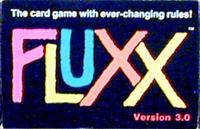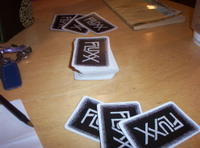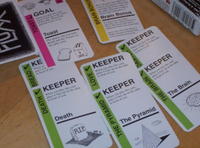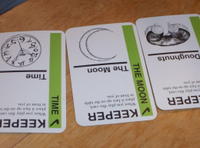11:25 AM
FLUXX, LUCK and NOMIC Games
I've met people who look down their noses at luck based games, and they have a point. FLUXX is one of those that gets its share of grief.

Here are a few random unattributed posts on the FAR end of the scale on Boardgame geek:
- Played it twice; won it twice; hated it twice. This is a game of pure
luck. - Bleagh. Much too whimsical. I can see why some people would like it,
but I would be happy if I never had to play it again -- and that's something
I rarely say about a game. - Not a fan. Too random for my liking!
- Weird game, not interesting at all. Not challenging, no stategies at
all, because there are constant changes. Do something better with the valuable
time you have to play! - Does this game ever end?
- When is a game not a game? Completely pointless. Unfortunately, my friends
love it. - A good waste of time. However I don't like wasting time...
- The WORST game I've every played. Mind numbingly boring and totally
arbitary. Not even beer and pretzels.
There has to be something going for this game, or it wouldn't have 638 comments about it on the geek!!! I admit, I like Fluxx, for what it is, and probably NOT for the reasons most people like it; it is certainly a light, quick playing card game that can be easily taught. It certainly IS random and can end very quickly or take forever to play. But that's not why I like or dislike FLUXX.
I like FLUXX because it is a card game with strongNOMIC characteristics. What does that mean? Basically, a game that has self-amendment (rule-changing) as part of the rules. The word "Nomic" was invented by Professor Peter Suber, to describe a game of self-amendment he invented as an intellectual exercise. In his words:
Nomic is a game I invented in 1982. It's a game in which changing the rules is a move. The Initial Set of rules does little more than regulate the rule-changing process. While most of its initial rules are procedural in this sense, it does have one substantive rule (on how to earn points toward winning); but this rule is deliberately boring so that players will quickly amend it to please themselves. The Initial Set of rules, some commentary by me, and some reflections by Douglas Hofstadter, were published in Hofstadter's "Metamagical Themas" column in Scientific American in June of 1982. It was quickly translated into many European and Asian languages. Games were regularly played, and kicked off, the ARPANET, the Defense Department network which sired the Internet. Nomic has been used to stimulate artistic creativity, simulate the circulation of money, structure group therapy sessions, train managers, and to teach public speaking, legal reasoning, and legislative drafting. Nomic games have sent ambassadors to other Nomic games, formed federations, and played Meta-Nomic. Nomic games have experienced revolution, oppressive coups, and the restoration of popular sovereignty. Above all, Nomic has been fun for thousands of players around the world. For me, it was intended to illustrate and embody the thesis of my book, The Paradox of Self-Amendment, that a legal "rule of change" such as a constitutional amendment clause may apply to itself and authorize its own amendment. (Nomic is the third appendix of the book.) |
Attribution: Professor Peter Suber, Philosphy Dept. Earlham College.
Mind you, the original Nomic as described by Peter Suber is something I find deadly dull, but it has its own fanbase of dedicatees.
Fluxx is one of those rare Self-Amending games where to PLAY the game, you are constantly changing the rules to the game. There are very few games like that. I can name only a few off the top of my head that were ever published commercially-- Cosmic Encounter being the prime example, and a few interesting side projects like DVORAK and 1000s of blank cards (both of which are rich in ideas!)
To illustrate why I think FLUXX is cool that way, I kept a brief record of a game I played with Annie at the coffee shop last night. It wouldn't fit on BLOGGER without messing up my formatting, so I posted it here:
http://mrnizz.bravehost.com/fluxx/Fluxxgamepage.html
Note how the rules are changing and the goals and actions change the direction of play. That is something that interests me.
Here's a few Game Day pictures:

At Start

Luck Favors Dad at first

The low run of Keepers early in the game generates a predictable reaction. Fortunately, some gaming papparazzi (one of Annie's friends) came by, distracting Anne from her misfortune for a bit.

End Game, Dad. I believe I nailed "Toast" with a stolen card!

End Game, Anne. Hampered by a lack of Keepers. There's LUCK again!
Anne seemed more frustrated at this one than at Castles (last week) but I imagine it was her anxiousness to flirt with the cute shopboys at the video game place next door.